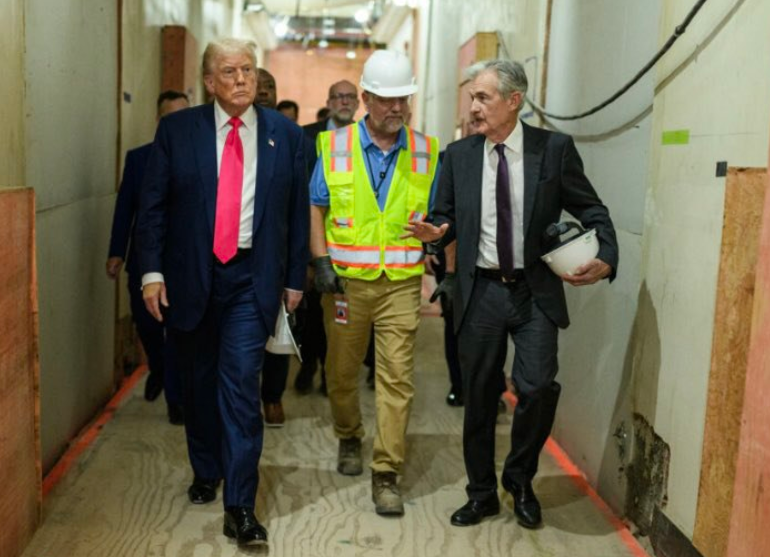President Donald Trump has reignited his criticism of Federal Reserve Chair Jerome Powell for keeping U.S. interest rates at two-decade highs, blaming the Fed for hurting homebuyers and farmers. Backed by Kansas Senator Roger Marshall, Trump argues that each percentage point in high rates costs the U.S. $365 billion annually. The controversy deepened as two Fed governors dissented, urging immediate rate cuts. With inflation cooling and global central banks easing, Trump’s attacks highlight growing political pressure on the Fed amid concerns about economic slowdown and tariff-driven inflation.
Trump Intensifies Attack on Fed Chair Jerome Powell As He Keeps Interest Rates At 4.5%
President Donald Trump has once again launched a scathing criticism of Federal Reserve Chair Jerome Powell, blaming him for keeping interest rates at their highest levels in over two decades. Trump, speaking in an interview, argued that the Federal Reserve’s refusal to cut rates is severely hurting the American economy, particularly ordinary citizens looking to buy homes and farmers relying on operational loans.
In his characteristic tone, Trump declared, “We were like the stupid people that didn’t know what we were doing,” referring to past economic leadership. He asserted that the U.S. should have the “lowest interest rate,” but instead ranks 38th globally, placing the blame squarely on Jerome Powell and his policies. Trump emphasized that every 1% point in higher interest rates costs the U.S. economy roughly $365 billion annually, citing this figure as evidence of the devastating impact of the Fed’s inaction.
The president further claimed that inflation is not a current threat, countering traditional economic wisdom. “Right now there’s no inflation,” he said. “Everybody thought there would be, but all we have is billions of dollars of cash pouring into our country from others that took advantage of us.”
Senator Roger Marshall of Kansas, a key Republican on the Senate Budget Committee, supported Trump’s critique. Speaking on the matter, he highlighted how the Fed’s interest rate hikes have harmed American farmers. “The average Kansas farmer with a million-dollar operation loan saw interest rates rise from 2% to 9%, leading to a record drop in net farm income,” Marshall stated. “President Trump is right—every point really matters.”

Marshall also reminded viewers of Powell’s now-infamous “transitory” inflation statement from March 2021. “It took 18 months just to peak and then a few more before coming down. Powell is always too late. That’s why President Trump calls him Jerome ‘Too Late’ Powell,” he said.
Senator Marshall, echoing Trump’s demand, argued for a rate cut of at least a quarter to a half percentage point, citing current economic conditions as sufficient justification. He added that other central banks globally have already begun cutting interest rates—at least 15 central banks have done so—underscoring America’s increasingly isolated monetary policy stance.
The recent Federal Open Market Committee (FOMC) meeting has stirred further controversy, with for the first time in 30 years, two Federal Reserve Governors—Michelle Bowman and Christopher Waller—publicly dissenting from Chair Powell. Both argued in favor of cutting rates now. Bowman, notably from Kansas like Senator Marshall, sees tariffs-related inflation as a temporary spike rather than a sustained threat. Waller echoed this sentiment, indicating a division within the Fed itself.
Marshall defended the impact of tariffs, dismissing fears they could lead to runaway inflation. He explained that only 11% of American consumer goods are imported, and even with a 10% tariff, the maximum inflationary impact would be around 1.1%—assuming the full cost is passed to consumers, which he believes is unlikely. “Manufacturers and wholesalers will absorb a lot of that,” he said. “It’s a one-time hit, not a long-term inflation driver.”
Trump’s economic strategy also includes an aggressive trade realignment aimed at reducing the United States’ massive trillion-dollar trade deficit. Marshall praised Trump’s success in rallying allies in Asia to economically isolate China. “He’s surrounded China—Cambodia, Thailand, Indonesia, Japan, Australia, Vietnam, Philippines, South Korea—he’s built a wall of economic partnerships,” he explained.
According to Marshall, China now faces a deadline of August 12 to respond to Trump’s demands, signaling a broader geopolitical strategy from the former president to rebalance global trade in America’s favor.
Trump’s rhetoric on interest rates and trade is resonating with many Republican lawmakers, especially those from agricultural states like Kansas, where the economic impact of rising rates is hitting hard. With Powell showing no signs of backing down just yet, the Fed may continue to be a major target as Trump sharpens his economic message ahead of November.
The growing dissent within the Fed, combined with mounting political pressure, raises significant questions about whether Powell can maintain his current stance without broader economic fallout—or political consequences.

